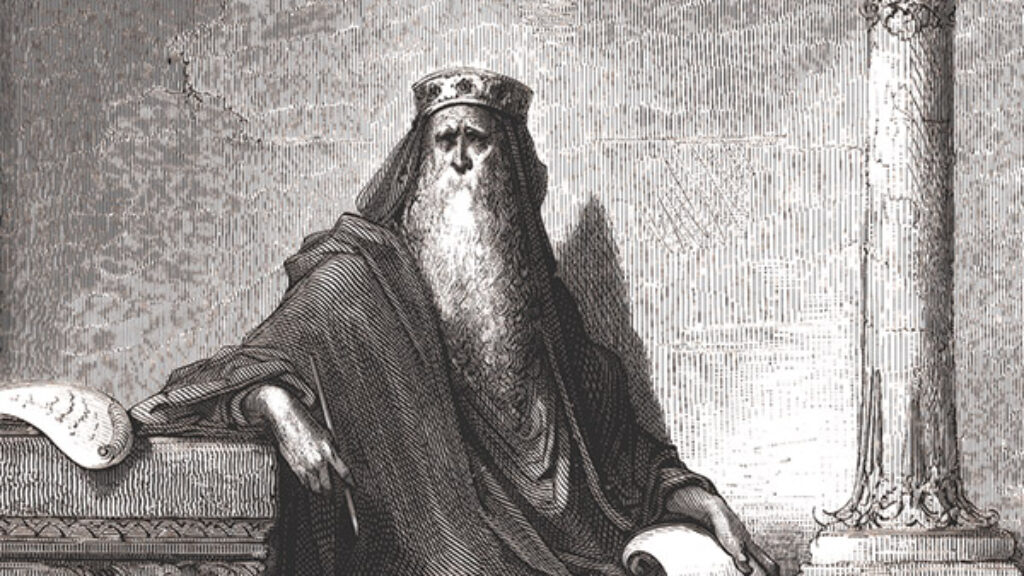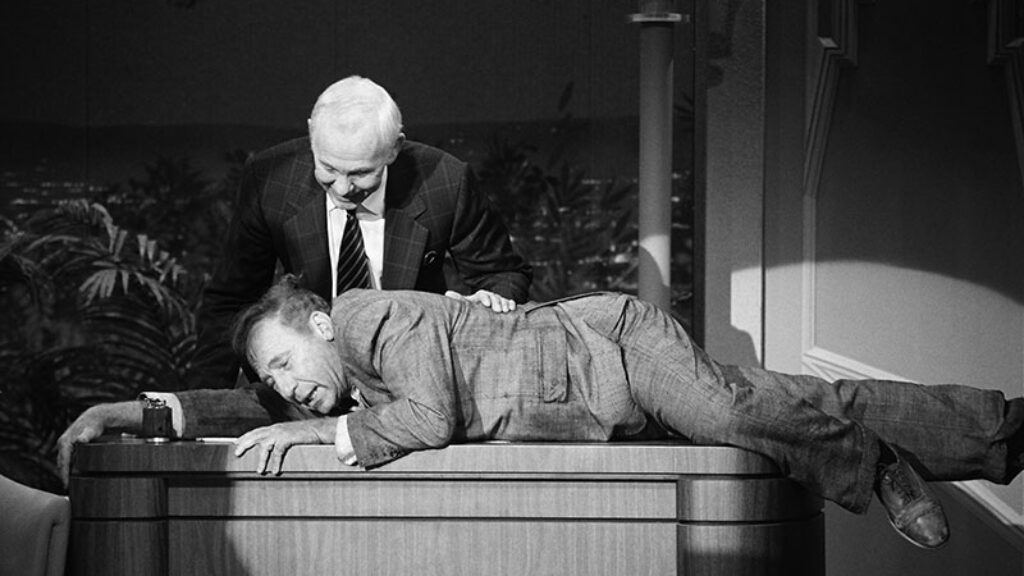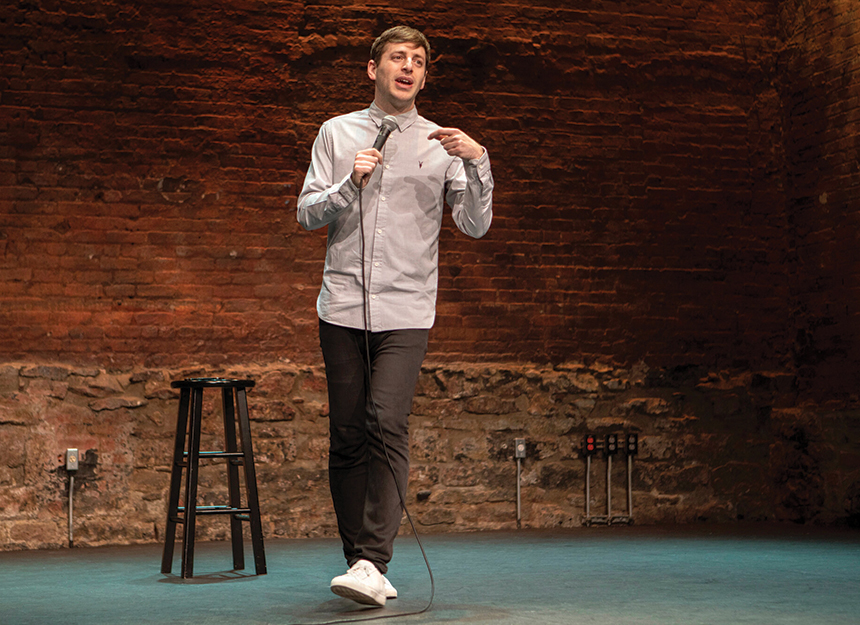Us or Them
In April, I went to see Alex Edelman’s one-man comedy show Just for Us at the SoHo Playhouse in downtown Manhattan (it’s now at the Greenwich House Theater through the summer). I had heard that it was very funny and that the centerpiece of the show involved Edelman’s infiltration of a group of white supremacists, with horror and hilarity ensuing. So I assumed that the “us” in question was, well, us: that this would be an evening of humor aimed at a Jewish audience. Indeed, I expected to hear jokes that a non-Jewish audience might not understand or might even find alienating and that the show would be unapologetic about that fact.
The show was indeed hilarious and, based on the number of kippot in the audience, word had gotten around that Edelman’s shtick would play particularly well inside the fold. But it was more complex and self-reflective than I had expected—and the title didn’t mean what I thought it did.
Just for Us is presented by Mike Birbiglia, a regular guest on This American Life who is a master of the solo comic storytelling form. Edelman has clearly learned from the master. He segues smoothly between interwoven story threads, effectively inhabits his characters, and makes clever use of his minimal set, which consists of just three wooden stools. Edelman lands laughs from callbacks to setups planted an hour before the punch line, and by the end of the evening, he’s tied his story lines up with a thematic bow that both satisfies and challenges his audience and reveals something significant about himself.
Edelman’s appealing comic persona is both an exaggerated version of his off-stage self and a canny projection of the audience’s expectations. What he’s built is a familiar Jewish type, a bundle of neuroses, insecurities, and fidgety intelligence but with a millennial updating (he jokes about being repeatedly tested for autism and ADHD). He’s also added an autobiographically “yeshivish” twist: Edelman grew up in Boston in an accomplished Modern Orthodox home and attended Maimonides School, a prominent Modern Orthodox school that was founded by Joseph B. Soloveitchik. Edelman’s whole presence conveys a reassuring sense of Jewish continuity, a feeling that The Jazz Singer will never be entirely out of date. (Indeed, Edelman even makes passing reference to his father’s concerns that the life of a stand-up comic isn’t Jewish enough, particularly in comparison to his brother, who grew up to be an Israeli Olympian.)
That feeling of continuity animates the two lengthiest stories that Edelman tells, one about his visit to the white supremacist meeting, the other about the time his family celebrated Christmas. Edelman prefaces the latter with a digression on what it was like to grow up in, as he puts it, “a really racist part of Boston called . . . Boston.” He was acutely aware of the New England social hierarchy in which old WASP families were always at the top, unapproachable and fundamentally inimitable, a club Edelman grew up longing to join, though he knew that he never could. Until one Christmas he did, at least briefly.
A friend of his mother’s, who was a member of the Boston aristocracy, suffered the unimaginable tragedy of losing essentially all of her family members in a single year. The prospect of Christmas alone was too awful to contemplate, and so Edelman’s mother decided that they would host her for Christmas. The Edelman family couldn’t serve a traditional Christmas ham to their guest, but they put up a tree (in the garage), hung stockings, sang carols, and watched Christmas movies with her. They even left cookies for Santa Claus. Edelman and his brother were enthralled.
The whole enterprise was undertaken over Edelman’s father’s strenuous, and entirely understandable, religious objections. So, fittingly, it was he who had to deal with a call from the school principal after the Edelman boys started telling their classmates about the amazing Christmas they enjoyed over winter vacation. Edelman senior defended his wife’s decision, arguing that she acted out of chesed in giving joy to her friend in a time of grief. The principal replied that they had also brought idolatry into their home and into their impressionable young children’s lives. Edelman’s father responded with one of the funniest punch lines of the evening: “Well, obviously you don’t understand the true meaning of Christmas.”
In a sense it’s a familiar assimilation story—but in another sense it’s entirely inverted when compared with, say, The Jazz Singer. Edelman’s Christmas story isn’t about being drawn out; it’s about welcoming in. Edelman’s family weren’t marginalized outsiders desperate to be accepted; they were the hosts, trying to make their lonely Brahmin guest feel at home. That sense of inverted hierarchies also suffuses the central story of the show, Edelman’s visit with the white supremacists.
It all started with a querulous tweet: “Curious about your whiteness? Come to our meeting.” Edelman was curious. The meeting turned out to be in a private apartment in Queens. Some of the laughs derive their energy from the sense of danger in infiltrating such hostile territory. But the main joke is both the ease with which he manages to fit in and Edelman’s manifest pleasure at doing so. (As Columbia philosophy professor Sidney Morgenbesser once quipped when he caught the renowned literary critic Lionel Trilling in his most pompous faux-Anglo mode: “incognito ergo sum.”)
Edelman helpfully explains to the white supremacists why their tweets aren’t going viral the way they want them to and flirts with an Aryan American princess named Chelsea. Halfway through the meeting, he’s convinced that if he wanted to, he could be running the group in a few weeks. Then somebody starts asking questions about his origins until he admits that, why yes, he’s Jewish (is that a problem?). The meeting erupts in chaos, and Chelsea gets to throw him out, screaming the titular line.
Edelman knows he is smarter, more cultured, more successful, and certainly funnier than Chelsea and her friends. “These are not life’s winners,” he says—and they aren’t even really that threatening, less proper Nazis than “Nerf Nazis.” Yet he left disappointed over his rejection. Why? Edelman suggests that there is something peculiarly Jewish but also troubling about a desire to fit in that is so powerful that one even wants to get along with those who openly profess their hatred of you. But of course, seeking love and approbation from hostile audiences is also kind of the job description of a stand-up comedian.
Why did Edelman really go to the meeting in the first place (that is, beyond the comedian’s perennial search for new material)? It’s one thing to know that you’re the kind of person who wants to fit in wherever you are. It’s quite another to actively seek out people who define themselves by their hatred of you. And it’s a bridge too far, I think, to equate his own in-group exclusiveness with theirs or to compare the at-the-window longing he experienced on Christmas in Boston and this trip through the looking glass to Nerf Naziland. Yet, Edelman manages to convey the real human pathos behind Chelsea’s cry. We all want something that is just for us.
At the end of the show, Edelman announced that his next project would be a similar piece about the Israeli-Palestinian conflict. His manager suggested a title: “Career Suicide.” That’s funny—but it might have been even funnier to say: and the great thing about making that my next show is that I won’t even have to change the title.
Suggested Reading

The Danish Prince and the Israelite Preacher
Hamlet, Shakespeare’s most peculiar tragedy, echoes one of the most peculiar books in the Hebrew Bible, Ecclesiastes. It also helps us understand its wisdom.
Why the Long Face?
David Grossman's newest novel, winner of the Man Booker International Prize, is an arresting, disturbing read with no obvious punch line but one long face.

History of Mel Brooks: Both Parts
On-screen, Mel Brooks was hysterically funny. Off-screen, he could quickly shift to morose or mean.
Digital Anti-Semitism: From Irony to Ideology
From tweeting trolls to digital incitement, a contemporary history.

Comments
You must log in to comment Log In